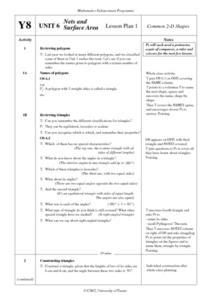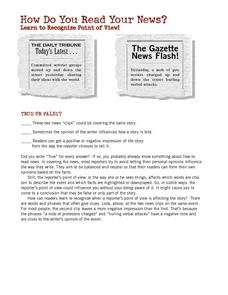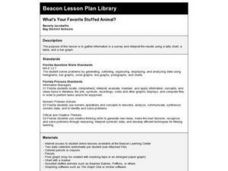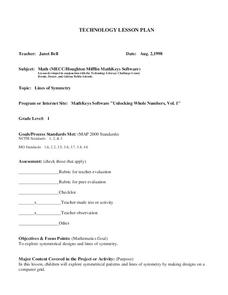Curated OER
Irony in Poetry and Prose (Fiction and Non-fiction Texts)
Middle and high schoolers examine the impact of irony in poetry and prose. In this figurative language lesson, they read instructor-selected literature and identify uses of irony. Then they discuss how irony enhances literature.
Curated OER
What Do Writers Do?
Pupils learn about honing their writing through editing. They write the beginning of a story, paying attention to vocabulary and detail. Then they split into groups of two to peer edit. After discussing ways they can improve their...
Curated OER
Writing to a Specific Topic
After a class discussion where learners make predictions about what will happen in a book based on its cover illustration, pupils are asked to compose a written response about an aspect of the story and include some of their own...
Curated OER
Meaty Words
Headlines from newspapers launch a discussion of image-rich, meaty words. Just as headline writers choose vivid vocabulary to attract readers, young writers develop headlines that capture the essence of a passage from a book they are...
Curated OER
Nets And Surface Area
Upper graders investigate how to find the surface area when using two-dimensional shapes. They conduct an investigation in groups while working sample problems given during class discussion with the teacher. They also review how to...
Curated OER
All Ears for Adaptation
Young scholars discuss different characteristics that enable animals to adapt to their environments. They work in pairs with one partner standing about one foot behind the other partner and cup their hands around their ears with palms...
Curated OER
Metamorphosis Magic
Students make different motions for each stage in the butterfly life cycle and plant a garden. In this butterfly life cycle lesson plan, students can take the mini gardens home and discuss how butterflies help gardens.
Curated OER
-ed Word Accuracy
First graders explore language arts by identifying the endings to specific words. In this suffix lesson, 1st graders add the -ed ending to familiar verbs and discuss the change in meaning. Students collaborate in small groups to practice...
Curated OER
-s Word Accuracy
First graders study language. In this word pronunciation lesson, 1st graders practice how to say various words that end in -s. They work as a group to discuss how to say the various words and what it means when -s is added to the end of...
TV411
How Do You Read Your News?
Words carry baggage. Class members are asked to consider the weight of words in an exercise that contrasts the word choices in two versions of the same event. Consider following the exercise with an activity in which pairs craft positive...
Curated OER
Transportation Choices and the Environment
Pupils study statistics and charts pertaining to how transportation and other energy choices impact the environment. They participate in small group discussions regarding concerns for the future.
Curated OER
Family Album "A Patchwork Quilt"
Third graders list of four important life events They create a quilt square for creating a whole class quilt. This project allows students to be creative and none of the squares look the same.
Curated OER
Charlotte's Web
Fourth graders focus on fluency by reading the book Charlotte's Web. In this reading strategies lesson plan, 4th graders partner read, do guided reading, and independent reading to increase fluency. Students use Venn Diagrams, discuss...
Curated OER
Cool Chemistry- DIY pH Indicator
Students study the differences between an acid and a base. In this pH lesson students view a demonstration then test chemicals in groups.
Curated OER
What's Your Favorite Stuffed Animal?
Second graders gather information in a survey and interpret the results using a tally chart, a table, and a bar graph. They' present their results of the during the final group discussion. The subject of the survey is favorite stuffed...
Curated OER
Computers: Caught in the Web
Young scholars conduct Internet research about various websites noting the design and appearance of them. Working in small groups, they compare and contrast the sites and share their opinions of them with classmates. They also examine...
Curated OER
Benefits of Cycling
Fourth graders discuss cycling and create a list of good effects from cycling. In this cycling lesson, 4th graders design a leaflet or poster to encourage cycling. Students debate the benefits of cycling.
Stanford University
The 1898 North Carolina Election
Pupils discuss why the Democrats defeated the Fusion ticket in the 1898 North Carolina election. In this content area reading instructional activity, learners explore three primary documents and answer guiding questions that help them...
Curated OER
Creating Sentences with Onomatopoeia Words
Third graders create sentences. In this sentences instructional activity students use onomatopoeia words to write sentences. They make a movement to match their onomatopoeia word. The students discuss why an author might use onomatopoeia...
Curated OER
Is That Fair: What is Fairness?
Young scholars discover the meaning of fairness. In this character education instructional activity, students create their own meanings of fairness and compare them to their classmates' definitions. The young scholars discuss fairness...
Curated OER
Cord Blood Banking and Transplantation
Students explore stem cells. For this stem cell lesson, students research print and Internet sources regarding types of stem cells and their attributes. Students discuss their research findings participate in a debate about cord blood...
Curated OER
How does Paper Making Contribute to Economics
Second graders investigate the numerous jobs it takes to create paper in the U.S. In this economics lesson, 2nd graders discuss where paper comes from, what types of trees are needed, and how the paper milling process creates jobs and...
Curated OER
Lines of Symmetry
First graders create symmetrical designs using a computer program. In this lines of symmetry lesson, 1st graders review their symmetrical designs and discuss other ways symmetrical designs can be made. Students work in pairs and use...
Curated OER
Dealing with Differences
Students list at least ten things they have a hard time doing. After reading and discussing Be Good to Eddie Lee, Students, in cooperative groups, write at least six ways people can assist people with disabilities.

























